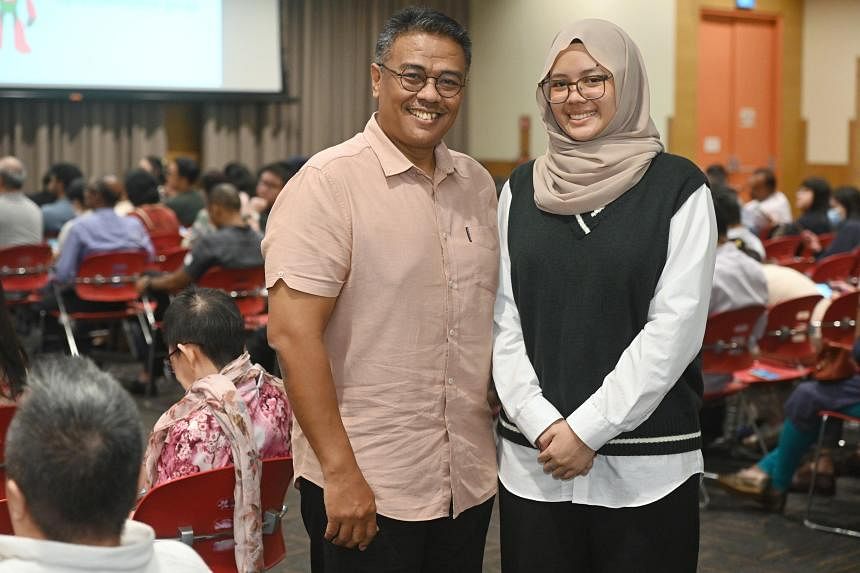SINGAPORE – He is better in Malay, while his daughter considers herself more competent in English.
Together, their individual strengths come in handy for their volunteer work helping with the translation of government materials from English to Malay and vice versa.
“My father is my supporter and motivator,” said 25-year-old Nor Djannah Djohan, an undergraduate in Malay language and literature at the Singapore University of Social Sciences. Like her father, she is a citizen translator.
Her father, Mr Djohan Abdul Rahman, 52, who teaches Malay at a secondary school, started as a citizen translator about two years ago, and has edited texts in posters and speeches.
“I think it is a good initiative that the citizen translators are translating our public communication materials into our four languages to increase accessibility to all,” he said.
Citizen translators will be better rewarded for their efforts in 2024 with e-vouchers and training opportunities.
Mr Tan Kiat How, Senior Minister of State for Communications and Information, said the enhanced recognition framework, which starts in January 2024, will recognise the important role of citizen translators in government communications.
He was speaking at an engagement session for citizen translators, which was organised by the National Translation Committee (NTC) at the Lifelong Learning Institute on Tuesday.
In 2021, the NTC launched the Citizen Translators project to tap the community’s expertise in raising the translation and language standards in Singapore following some glaring lapses.
Hungry Ghost Festival was mistranslated as “Hungary Ghost Festival” in Chinese in a 2002 Singapore Tourism Board guide.
The country’s 2,300 citizen translators – growing from 1,180 in 2022 – help to identify and report translation errors in government communication materials, and provide suggestions to rectify them.
They also help to vet and proofread translated materials.
“Our efforts in translation are important to help Singaporeans, especially our seniors, to access accurate public information, including important announcements from the Government,” said Mr Tan, who is chairman of the NTC.
He added: “Translation, which is closely intertwined with language and culture, is also an important part of our effort to strengthen our identities – all the more so in a multicultural, multiracial society like Singapore...”
Currently, citizen translators are recognised for their level of participation under a two-tiered system.
Those who participate in at least three activities within a calendar year qualify for the basic tier and receive an e-certificate of participation. Those who participate in at least five activities qualify for the enhanced tier, and receive the e-certificate as well as an e-voucher, and are eligible for learning and development opportunities.
The two-tiered structure will be adjusted to a points-based system to allow more citizen translators to qualify for the basic tier and attain the enhanced tier.
Basic-tier translators will receive e-vouchers for their participation, while those on the enhanced tier will get training opportunities such as translation workshops.
The enhancements are “added incentives” which could entice more to join as citizen translators, said Mr Djohan. But he added that translators like himself do not do it for incentives or rewards.
He said: “What really drives us is our passion to see correct translations used in public communications.”
A Ministry of Communications and Information (MCI) spokesperson told ST that it continually reviews its recognition framework to better appreciate the time and contributions of the volunteer citizen translators.
“MCI has a year-long recruitment drive to encourage Singaporeans who have an interest in translation and languages to join our citizen translator community. Working together, the Government and citizens help contribute to more inclusive Government communications,” said the spokesperson.
The SG Translate Together Web portal, which was launched in 2022, clocks more than 10,700 visits and has over 3,400 translations generated on average monthly. It allows users to generate translations suited to the local context.
Mr Tan also presented certificates to the 2023 recipients in the Translation Talent Development Scheme. It was launched in 2018 to support translation and interpretation practitioners from the private sector in deepening their skills.
Recipients get up to $10,000 to offset 90 per cent of the expenses incurred when they participate in capability development programmes related to translation, interpretation or languages in Singapore and overseas.
To date, there have been 36 award recipients under the scheme, and over $230,000 has been disbursed.
One of five recipients in 2023, Ms Nor Djannah said it will help pay the fees for her language-related university course.


